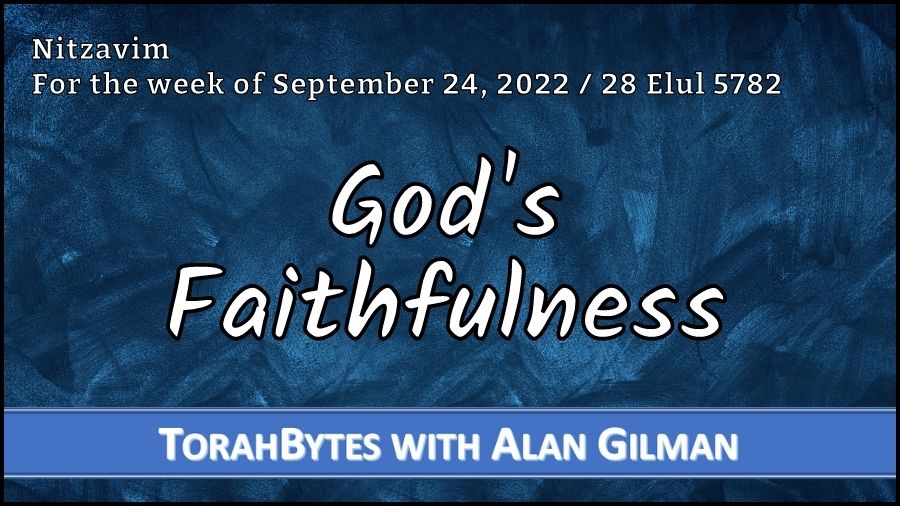For the week of September 24, 2022 / 28 Elul 5782

Nitzavim
Torah: D’varim/Deuteronomy 29:9 – 30:20 (English: 29:10 – 30:20)
Haftarah: Isaiah 61:10 – 63:9
Download Audio [Right click link to download]
And when all these things come upon you, the blessing and the curse, which I have set before you, and you call them to mind among all the nations where the LORD your God has driven you, and return to the LORD your God, you and your children, and obey his voice in all that I command you today, with all your heart and with all your soul, then the LORD your God will restore your fortunes and have mercy on you, and he will gather you again from all the peoples where the LORD your God has scattered you. (D’varim/Deuteronomy 30:1-3)
This section of the Torah is extraordinary. First, given all that God had done for the people of Israel up to this point, one would not think of anticipating failure resulting in exile. But more surprising is the promise of return. That God would make room for Israel’s restoration after suffering the consequences of their unfaithfulness is core to God’s revelation of himself and his character.
God used the people of Israel as the stage for making himself known to the world. It is through the giving of Torah that we learn the truth that the universe was created not by some meaningless random process, but personally by God through his word. We discover that it was made not as a substandard, less real, evil material mistake, but as a very good complex design within which God’s purposes would be accomplished. We learn that human beings are distinct from the rest of creation due to our being made in God’s image. And that we have been commissioned to care for and rule over Planet Earth. The brokenness of creation is due to the first humans’ failure to obey God, but this state is temporary until God eradicates the influence of evil. How that works out is what the story of the rest of the Bible is all about.
The promises to Abraham as passed down through his son Isaac and grandson Jacob are the foundation of the development of the people of Israel, whom God would use to accomplish the restoration of his creation. God’s deliverance of Israel from Egypt demonstrates his role as rescuer. His giving of the Torah at Mt. Sinai reveals how human image bearers are to reflect his holy character. Israel’s failure to live up to God’s ways shows how humans cannot resolve our alienation from God on our own. God’s judgement upon Israel emphasizes the seriousness of that alienation. His promises with regard to the Messiah returns us to the rescue motif in which we are reminded of our ongoing need of God to fulfill his promise of creation restoration.
Central to God’s character is his heart for restoration. Not only is this a foundational theme with regard to his creation generally, but also in his understanding the dynamics of how he relates to his people. Throughout the whole of Scripture, including the New Covenant Writings, he remains faithful to Israel despite his harsh warnings and severe punishments. As he said through Moses in this week’s parsha, he was determined to always remain open to the possibility of Israel’s restoration even after being exiled among the nations. Paul wonderfully elaborates upon this in Romans, chapter 11 (see my booklet on the subject for more information).
While God’s faithfulness to Israel has been a great source of hope to Israel, it is not for Israel alone. When one realizes how much we have received from God, starting with our very existence, we have no claim upon him. Every act of love and generosity on his part is derived exclusively from him. After all he has done, he has every right to make any and all demand of us, not to mention calling us to account for every abuse of our place and position in life. And yet, through Israel, he has demonstrated that he is always ready to restore us to right relationship to him whenever we turn back to him.
The New Covenant Writings strongly emphasize God’s faithfulness as rooted in Hebrew Scripture. In the well-known Parable of the Prodigal Son (Luke 15:11-32), while the son’s return journey must have taken some time, as far as his father was concerned, despite the level of disregard his son had shown him, his acceptance was immediate. We also read how God’s heart of restoration is well-expressed by John in his first letter: “If we confess our sins, he is faithful and just to forgive us our sins and to cleanse us from all unrighteousness” (1 John 1:9).
Scriptures taken from the English Standard Version